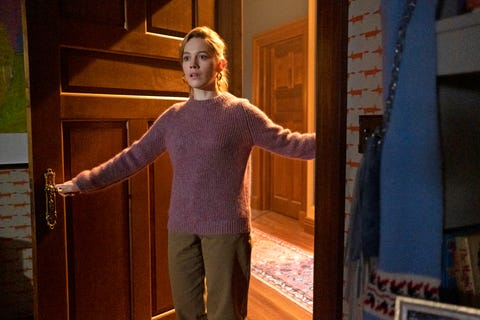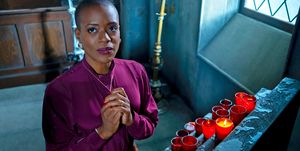Spoilers for The Haunting of Bly Manor episode 9, "The Beast in the Jungle," below.
Like all the best ghost stories, The Haunting of Bly Manor is really about the
human mind. Over the course of nine episodes, the show explores grief, denial, shame, dementia, and anxiety, all through the prism of a haunted house in the English countryside, where an American au pair is hired to take care of two orphaned children.
Victoria Pedretti’s Dani looks at first glance like a classic gothic archetype—the naive ingenue walking unsuspectingly into a trap. In Henry James’s The Turn of the Screw, which inspired the series, the governess appears that way at first, but is increasingly revealed to be unreliable and possibly unstable. The novella’s central question is whether the governess’s horrifying visions are real or a symptom of insanity. There is no question in Bly Manor about whether Dani is sane, or whether the ghosts haunting the manor are real, but her mental health is central in a different way.
Pedretti's Dani is guileless but guarded, her effervescent personality belying a coiled spring of tension stemming from years of guilt and repression: Dani is a queer woman who came of age in 1970s America, and tried desperately to make herself want the things society told her she should. When the illusion became impossible to maintain, she told her fiancé and childhood best friend, Eddie, why she couldn’t marry him. Seconds later, he died in a freak car accident.
“The one time she decides to express herself to her confidant, the person she loves the most in the world, he dropped fucking dead!” Pedretti exclaims when we catch up by phone. “So she takes that as a message that, hey, maybe you should just lock that up and throw away the key.”
But repressed truths have a way of emerging, and Dani’s anxiety keeps bubbling to the surface after she arrives at Bly Manor, plaguing her with terrible visions that have nothing to do with the manor’s actual ghosts. It’s only once she meets Jamie (Amelia Eve), the house's blunt but perceptive gardener, that she begins to heal. Pedretti speaks to ELLE.com about depicting anxiety as a strength rather than a weakness, how Dani’s costumes reflect her changing mindset, and how Dani and Jamie’s romance anchors the show.
When we spoke on set earlier this year, you were talking about the comparison between Nell in The Haunting of Hill House and Dani. You said they were both silenced in different ways.
For very different reasons, they both had to be very careful in who they chose to speak to, because they had a tendency to not be believed. Nell tries to silence herself to her family, even though she wears her heart on her sleeve and she can't help trying to draw her family together to understand the truth of what's going on. But in the case of Dani, she silences herself because she knows very well what it is to be a queer person in the 1980s. She doesn't want to be silenced or cast aside, so she does it to herself, I guess.
Even before we see Dani’s backstory in America, she’s clearly desperate to reinvent herself. What exactly is she seeking when she takes the job at Bly?
I think that we all deserve the ability to reinvent ourselves. That’s getting more and more difficult as cancel culture and social media gauge who we are, what we're supposed to say and feel and do, and how others are supposed to respond to it. But there's great joy in finding anonymity again and being able to be whoever you want to be. There's something really powerful about how she convinces herself that if she plays this role, she could be this thing, when ultimately this is not true. There is one version of ourselves. Although we all play many roles and parts in our existence, there is something that binds them together, which is who you are as person. And she ultimately serves everybody better when she's being her fucking self. That’s what she has to learn.
Dani's anxiety attacks are a big part of the burden she's carrying at the start of the show. What did it mean for you to portray that experience?
It's a really valuable thing to show, because…what the fuck? A heroine with anxiety? Where have I seen that before? And it's true. There's many people that are extremely sensitive, do extremely difficult things, and make large impacts on the world. They do not need to be cast aside. She is capable of so much, clearly. I'm really glad I had the opportunity to portray that. Especially in relation to a character like Dani, who eventually really, really confronts it. Because a lot of the time when you see it, it is in relation to Eddie. That kind of sends her off. She's starting to feel good. And all of a sudden she's thrust back into memories of why she doesn't deserve to feel that way, and she has this deep fear. He throws her off into a spiral. But when it comes to real things to be afraid of, she's always right there, ready to go.

I sometimes think anxious people are better prepared for crises, because they spend so much time bracing for the worst case scenario.
I think that that’s absolutely true. Anxiety doesn't mean we're weak. It means every so often you get irrationally afraid of things. Doesn't mean you can't figure out how to combat it and deal with it. It isn't the main defining characteristic of you.
Dani and Jamie’s love story is such a joy to watch. What was your experience building that relationship?
There's something really beautiful about how Jamie and Dani come together. Not immediately for the sake of love, but at first they're building a sense of camaraderie. They gradually see the ways in which they're uniquely prepared to be there for each other. They just got the tools. Dani has an anxiety attack, and Jamie's instinct is to say exactly what Dani needs to hear. We're very lucky when we find those people that don't make us ashamed for who we are, but rather say, "It's cool. It gets like that sometimes." They slowly establish trust and boundaries with one another, and they just take it day by day. As Jamie eventually says, even within all the chaos of life and the tragedy they know is awaiting them, it's still worth it to be together.
Dani's wardrobe changes quite a bit throughout the season. How important were the costumes for you in building the character?
She finds herself getting more and more comfortable as the season goes on. A certain look was very important to her in terms of hiding her authentic self. But as the show goes on, she’s breaking down some of the facade and questioning the functionality of the shit she does. How much am I actually hiding by putting up this facade? Very little. People are still seeing through it, and that's true about all of us. Ultimately, we cannot control the way people see us. If we're trying to do that, it's pretty unproductive.
Running after the children, dealing with all these crazy things at the manor, prompts her to put a bit less effort into [her clothes], but she still likes to turn a look. Even as it goes on, she loves fashion and she likes feeling feminine and really enjoys expressing herself creatively. I always remember the costume she’s wearing when the Lady in the Lake shows up. She's in this speckled, dark pink sweater with brown pants and a pony tail, but she's still wearing those big-ass earrings she loves. Because they make her feel good. There's certain things that won't change.

Dani’s monologue in the finale, where she says she feels like she’s being stalked by this beast and it’s eventually going to get her, felt like a metaphor for a lot of things in real life. How did it resonate to you?
I guess the biggest parallel would be like a cancer or a parasite. Something inside you that is invading and slowly taking your life source away. But also just death in general—I'm sometimes struck by the fact that I'm going to die. But in terms of filming, I tried to relate it more within my imagination about what it would actually feel like to be in that situation. I chose to make it more tangible and physical within the way I was imagining things.
The season is about memory. Owen’s mother dying from dementia early on feels like a very deliberate choice as the show then goes on to explore these characters who are trapped in their memories.
Ghosts have been described in many ways on both seasons of the show. But I think there's something very significant about the idea that, regardless of whether or not something is continuing to happen, we have these experiences that left an impression on us and we hold them. We hold them within our memories. The great loves of our lives now and past, but especially past—they have made an impact. When it ends, it doesn't end. It's still there. And I think that that's a very true and beautiful sentiment. Whether it is death or a breakup, you don't forget it—even when you do.




